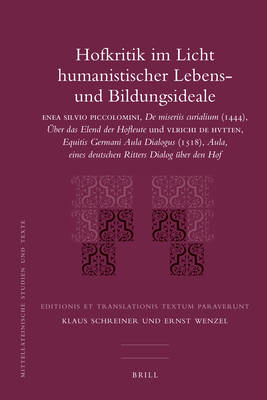
- Afhalen na 1 uur in een winkel met voorraad
- Gratis thuislevering in België vanaf € 30
- Ruim aanbod met 7 miljoen producten
- Afhalen na 1 uur in een winkel met voorraad
- Gratis thuislevering in België vanaf € 30
- Ruim aanbod met 7 miljoen producten
Zoeken
Hofkritik Im Licht Humanistischer Lebens- Und Bildungsideale
Enea Silvio Piccolomini, de Miseriis Curialium (1444), Über Das Elend Der Hofleute Und Vlrichi de Hutten, Equitis Germani Aula Dialogus (1518), Aula, Eines Deutschen Ritters Dialog Über Den Hof
Klaus Schreiner, Ernst Wenzel
€ 235,45
+ 470 punten
Omschrijving
Royal and princely courts in the late Middle Ages and Early Modern period did not only fill the roles of centers of government. The striving for a synthesis between power and the mind made courts into sites of art and literature, of instruction and education. Sons of nobles learned at court not only the use of weapons, but also reading, writing and arithmetic. Jousting gave young knights the opportunity to test their weapons skills and horsemanship. Moreover festivities were a part of court life, and feasts were celebrated extravagantly. Those nobles who lived as knights as well as the academically educated bourgeois used royal and princely courts as opportunities for assuring their professional careers and for social advancement. The reality of the social and ruling fabric of the court included in the late Middle Ages and Early Modern period some rough criticism from those eloquent contemporaries who branded the court as a morally corrupt place of vices. Church reformers brought the courtly lifestyle and the Christian ethic into irreconcilable contrast. How Enea Silvio Piccolimini, the humanist occupying the seat of St. Peter in Rome, and Ulrich von Hutten, the knightly poet, perceived, criticized and justified courtly life, is the subject of this book.
Specificaties
Betrokkenen
- Auteur(s):
- Uitgeverij:
Inhoud
- Aantal bladzijden:
- 252
- Taal:
- Duits
- Reeks:
- Reeksnummer:
- nr. 44
Eigenschappen
- Productcode (EAN):
- 9789004210318
- Verschijningsdatum:
- 14/10/2011
- Uitvoering:
- Hardcover
- Formaat:
- Genaaid
- Afmetingen:
- 160 mm x 240 mm
- Gewicht:
- 576 g

Alleen bij Standaard Boekhandel
+ 470 punten op je klantenkaart van Standaard Boekhandel
Beoordelingen
We publiceren alleen reviews die voldoen aan de voorwaarden voor reviews. Bekijk onze voorwaarden voor reviews.








